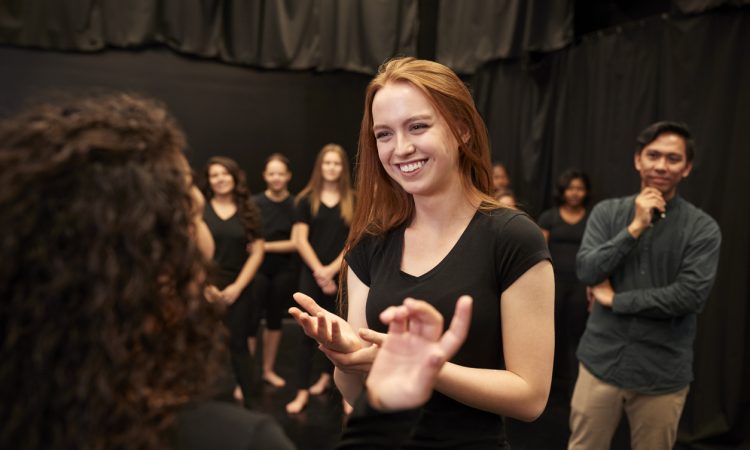As career development practitioners, part of our work is guiding our clients and students to communicate their best selves to prospective employers through their targeted job application documents and interviews. However, a more significant component of our interaction is to help them manage their emotions, beliefs and habits during their job search activities. This has become even more pronounced since the onset of the pandemic in this volatile and uncertain time.
What if I told you that I have discovered a superpower that would make you as well as your clients resilient to rejection, adaptable in ambiguous circumstances and fearless in public speaking, job interviews and networking? Or that you could develop this muscle for deeper interactions with your colleagues and clients (or students)? And would you believe me that this Zen-like mindset only gets stronger the more you share it with others? I would like to introduce you to the power of improv.
What is improv?
Improv is a style of theatre, typically comedy, that is unscripted and unplanned. It is created spontaneously by a group of performers who collaborate to flesh out the story, characters, action and dialogue. If performed in front of an audience, the players might seek suggestions from the crowd as inspiration for a performance.
In the fall of 2015, I was inspired to embark on a personal improv journey after watching a few improv performances and attending drop-in workshops at a local community centre. I just had to learn more. I signed up for a training program to learn the foundations of this comedic art. These sessions, led by experienced improv facilitators, covered the fundamentals of spontaneity, story, character and environment.
Why is improv important for your career and professional practice?
We don’t learn from successes, but from standing up after we fall. The improv mindset is a fantastic antidote to perfectionism and shushing our inner critic when we need to be open to opportunities. As practitioners, we have all had to learn how to improvise when many workplaces shut down and migrated to online interactions during the pandemic.
In one of the common warm-up activities in my improv classes, we would all stand in a circle and take turns tossing a ball to each other while counting up. If the intended recipient dropped the ball, we would all celebrate and cheer then restart the count. This was a simple, low-stakes game that packed a lot of lessons. The idea behind this warm-up was to get us familiar with embracing failure as part of the learning process, not taking ourselves so seriously and being able to move on from our mistakes – transferable lessons that apply to our line of work.
“The improv mindset is a fantastic antidote to perfectionism and shushing our inner critic when we need to be open to opportunities.”
Improv has also helped improve my workplace communication and collaboration skills. In another exercise, me and my classmates were seated in a circle, facing outward with our eyes closed. Piece by piece, we had to come up with a narrative as a cohesive group. We could not rely on visual cues, body language or eye contact to know who was jumping in next – yet it was the most successful experience I have had co-creating with people.
As a group, we had to actively listen to each other’s offers and build on them. No one person hogged the story or blocked; everything got accepted with joy, which was a powerful and attracting element. This storytelling exercise was not about being funny or right, but about each of us taking incremental steps and making offers that helped set up our teammates, without knowing who would pick up the baton next. There was such a sense of trust that was built as we all tried to help the next person look amazing.
Taking incremental steps, active listening and sense of trust were characteristics I continued to carry over into my work environment. I leaned even more heavily on these skills when the pandemic hit and I collaborated with my fellow instructors to migrate our teaching content online.
How can improv help your clients in their job search?
Job search can be an ego-deflating time for our clients and students. Self-doubt fills their minds when they do not get invited to interview, or offered the job, or any response at all from the employers they apply to. Improv can be a way to reframe that the feedback.
To combat this, a fundamental tenet of improv is “yes, and” which inspires players to build on what is being offered by their teammates or by the circumstance of the scene. Instead of resisting or blocking a suggestion, a good improviser accepts the new piece of information and adds to the scene. This mindset can apply to our clients and students in the face of rejection to shift the narrative. As career practitioners, you have been helping your clients “yes, and” these perceived negative moments into positive data points to help them improve their job search process.
How can get started with your own improv journey?
As you can see, you have already been practicing improv in your professional life without realizing it! Of course, there is a time and place for this skill. A balance needs to be struck between collaborative creativity and then funneling ideas to reality. But I believe that the improv mindset is a muscle worth continuing to develop to shield you from the volatile, uncertain, complex and ambiguous circumstances we encounter as career development practitioners, especially as we guide our clients and students through job search during and after this COVID-19 pandemic. Real life, like improv, has no script. This training will renew your resilience in so many ways as it has in my life as a new mother, grad student and career educator.
Want to write for CareerWise? Check out our Submission Guidelines and send in a proposal! All levels of experience welcome.




